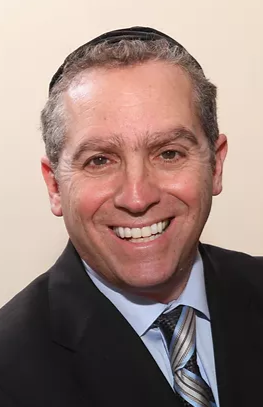
In last week’s Parasha we discussed many of the commandments between man and man; that is, between ourselves and others. This week’s Parasha is Terumah, and it describes the building of the Mishkan and the donations that are to be made towards this holy undertaking. The Parasha begins with the Pasuk, "Hashem spoke to Moshe, saying: Speak to the children of Israel and let them take for Me an offering (Terumah); from every person whose heart inspires him to generosity, you shall take My offering." Why is the opening sentence of this Parasha worded this way? Should it not read, Let B'nei Yisrael give Me a Terumah, rather than take for Me Terumah?
The answer is that when you give, you are actually getting more than what you are giving away, because when you give, as we discussed in last week’s Perashah, you will receive so much more in the way of Berachot from Hashem! Rabbi Diamond would often quote us a gemarah that just as we must salt our meat in order to preserve it and keep it fresh, so too the way for us to protect our money and preserve it, is to give it away to charitable causes.
I heard Ralph Tawil A'h speak many times about his personal experiences of how he kept giving tzedakah and how Hashem continued to bless him with more and more wealth! Mr. Tawil continued to say "I keep trying to test Hashem but He keeps giving me more!" I heard his words as a formula for success! Hashem says it clearly in parashat Re'eh (14:22) "Asher Te'asher" which is a double lashin...give 10% and I will make you rich! Hashem says only on this "You can test me."
The Pasuk continues to say, "From every man whose heart motivates him you shall take my portion." What does this mean? We are all aware that when you give to a worthy cause, you have to give with your heart. I know from my own personal experiences that whenever my heart became motivated to give because of a heartwarming speech or a sincere personal encounter, I would give much more and I would give it with Simcha! Many times the speech would bring me to tears. I remember clearly going from Shul to Shul during the summer Sephardic Bikur Holim fund-raising drives helping to raise money for SBH, how Joseph Beyda A"H spoke to the people.
I would watch how his eyes would tear up as he spoke from his heart about personal encounters that he experienced with some of the clients he was dealing with on a daily basis. I learned and mentored from him how to speak that same way, by telling stories of clients of SBH that I had became personally involved with, so that I would also be able to motivate the hearts of the people I was addressing on those Shul drives.
There is a famous story about brothers Nathan and Isadore Straus, who built a retail empire at the end of the 1800s which included Macy’s and Abraham & Straus department stores. In 1912, they both took a trip with their wives to pre-state Israel. Nathan and his wife Lina saw the poverty there and established soup kitchens and other charitable institutions. Isadore and Ida returned to the States on the luxurious Titanic, where they lost their lives heroically, as Isadore refused to take the place of the women in the lifeboats. Ida refused to leave her husband, and urged her maid to take her place instead. Nathan and Lina stayed behind to help the needy, leaving their berths on the Titanic empty.
So because they were saved from that tragic disaster, Nathan saw this as a sign from above, and the couple decided to devote the rest of their lives to contribute to many charitable causes in Israel. They opened a school and a health clinic and offered one of the first major gifts to Hadassah Hospital. Over their lifetime they gave away two-thirds of their fortune to many charitable institutions. In 1927 the city of Netanyah was named after Nathan Straus, and there’s a Straus street in Yerushalayim thats also named after them. We learn from this story how true is the famous phrase from the gemarah in Baba Batra (10a) "Tzedakah Tatzil Mimavet"...Charity saves a person from death!"
A few Pesukim later (25:8), Hashem says,Ve’asu li mikdash ve’shachanti betocham. "They shall make a sanctuary for Me so that I shall dwell among them..." Grammatically, we would expect the Pasuk to say, “I will dwell in it.” Instead, the Torah uses the word betocham, "among them" or “in their midst.” Hashem chose the Jewish people as his nation, and He is saying that He wants to rest the Shechinah among us always. Today, we don't have the Mishkan or the Bet Hamikdash, but we do have our Synagogues, our homes, and our hearts, where we want Hashem's spirit to reside always. So, when possible, we must build our Synagogues with all the finest material, as the Pasuk instructs: With gold and silver and copper etc. But most importantly, we must keep the decorum of our Shul at the highest level, because we are there for just one purpose, and that is to pray and speak to Hashem with Kavanah (Concentration) and Devotion!
In a few weeks we will be celebrating the great holiday of Purim. The Gemarah says that every Shabbat and Jewish holiday is "half spiritual, half physical." We spend part of the day praying in shul (the spiritual), and the rest of the day eating a fine meal and relaxing at home (the physical).
True spirituality is not achieved by meditating alone on a mountaintop, or by taking vows of abstinence in a remote monastery. Jewish spirituality comes through grappling with the mundane world in a way that uplifts and elevates. That's why Yeshivot are always located near towns and in the bustle of commercial activity. Jewish consciousness says: Don’t retreat from life; elevate it. On Friday night, we raise the cup of wine to make Kiddush and sanctify the Shabbat day. Spirituality in Judaism can be found everywhere.
One exception to this rule is Yom Kippur, when both halves are spiritual: We spend our entire day praying in shul, with no food or drink and not even the comfort of leather shoes on our feet. The second exception is Purim, when both halves are physical: We feast, visit friends, dress up in costumes, and drink to excess.
The Vilna Gaon explains that the word "Purim" is found in the biblical name for Yom Kippur – Yom haki-PURIM – which means “a day like Purim.” That which we accomplish on Yom Kippur with spiritual pursuits, we accomplish on Purim with physical pursuits. These holidays are two sides of the same coin, two opposite halves of the same day.
Interestingly, we see the balance of half-physical/half-spiritual also reflected in the preparations for each of these holidays. On Yom Kippur, we prepare for the fast by having a feast the day before. On Purim, we prepare for the feast by fasting (Taanit Esther) the day before. At first glance, we would assume that Yom Kippur is the greater of the two days. But in one sense, Purim is even greater: It is easier to achieve spiritual elevation on a day like Yom Kippur, when we pray and have no time for forbidden activities like gossip or getting angry. By fasting, the soul achieves dominance over the body.
But on Purim, in our state of rambunctious inebriation, it is much harder to maintain our human dignity. As Rabbi Eliyahu Kitov writes: "If one attains holiness through affliction, and another attains holiness through indulgence, who is the greater of the two? It may be said that the one who attains holiness through indulgence is greater, for the attainment of holiness through indulgence requires an infinitely greater degree of striving and effort." In this way, the challenge of Purim is greater. That’s why, by comparison, Yom haki Purim is only "a day like Purim."
According to our Torah, the only people to see the world in a state of perfection were Adam and Eve, who lived in the paradise of Eden. Yet they fell from that state by eating from the Tree of Knowledge of Good and Evil. That is, they pursued the world of illusion, where the transcendent universal good is masked by the seeming imperfection of evil.
If we approach Purim correctly – reaching a light-headed state of no longer knowing good from evil – we actually realign our perspective by seeing the transcendent as the source of all physical reality, thereby revealing its hidden perfection. Thus Purim at its peak is a taste of Eden. The potential for spiritual elevation on Purim is tremendous. As we're drinking and partying on Purim, let’s keep this in mind and not let the opportunity pass us by.
May we all be motivated by our Hearts to give as much as we can to worthy causes for altruistic reasons and not in order to gain honor from our peers. Also, may we all maintain our Synagogues with the highest level of Decorum and Kedusha so that we may be worthy of always having the Shechinah rest among us. Also, as we approach the holiday of Purim, let us take advantage of the holiday to elevate our Neshamot through our celebration of being saved from the evil Haman through Hashem’s hidden hand! Amen!
Parasha perspective By Jack E. Rahmey from the teachings and guidance of Rabbi Amram Sananes.








